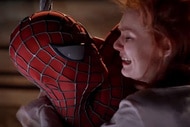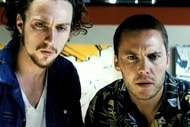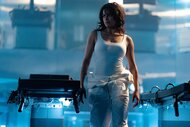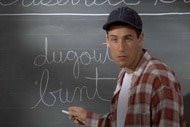Create a free profile to get unlimited access to exclusive videos, sweepstakes, and more!
Glass is a superhero movie about how no one knows what a superhero is
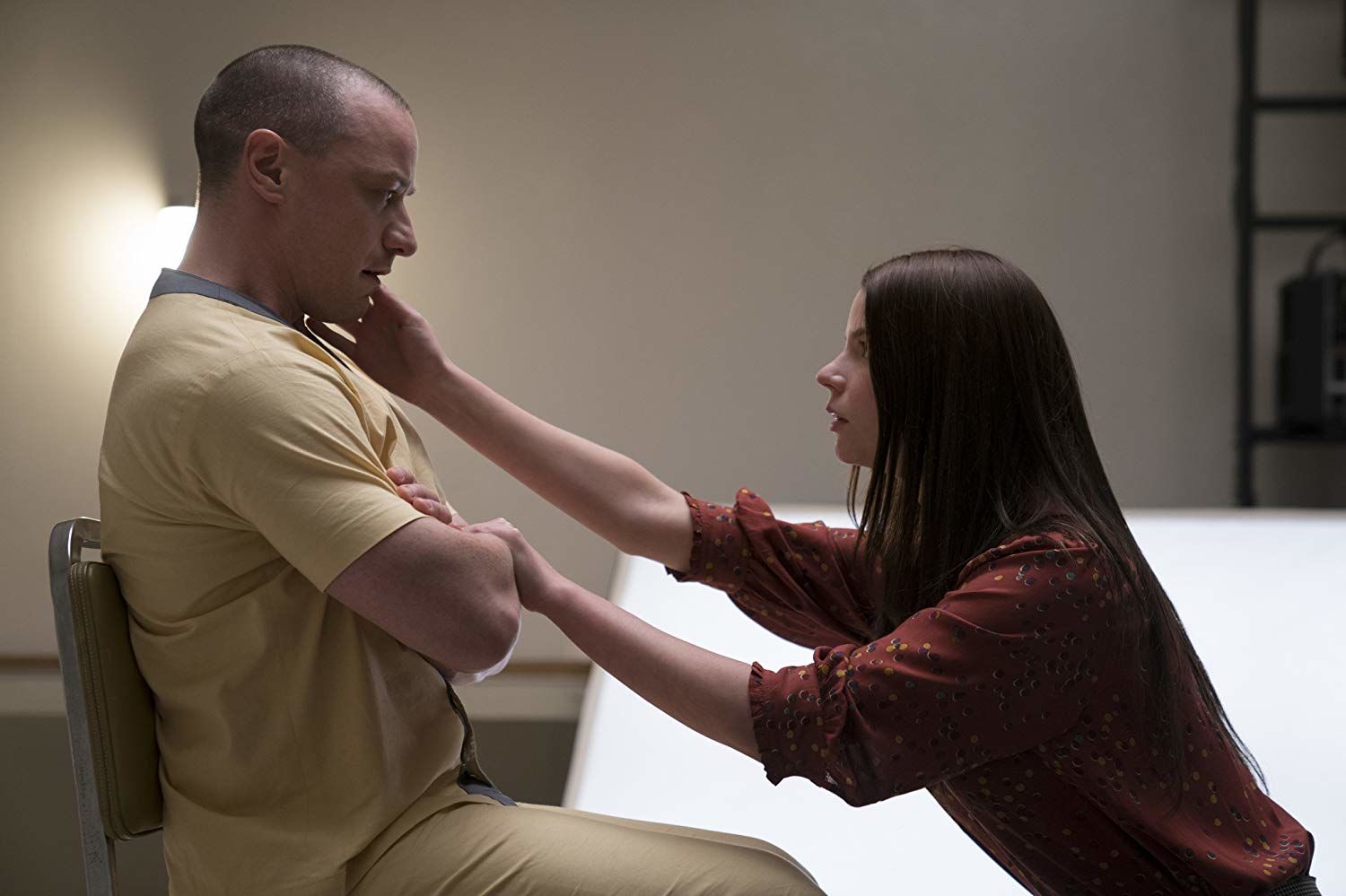
Like nearly all M. Night Shyamalan films, Glass is full of big ideas that don’t always pay off. It’s a film about belief in oneself, about recovery from trauma, and about humanity’s potential for extraordinary things. It is also about superheroes. It’s been nearly two decades since Shyamalan first introduced his grounded take on comic book heroes, and this was his opportunity — amid a sea of superhero media — to expand and refine it for an even bigger audience. We finally got see what an M. Night Shyamalan superhero universe could look like.
Sadly, and bafflingly, in Glass that takes the form of a superhero movie in which no one seems to know what a superhero is.
**Spoiler Warning: There are spoilers for Glass below.**
Much of Glass’ convoluted, often all-too-convenient plotting builds upon the thesis set forth by Elijah Price (Samuel L. Jackson) all the way back in Unbreakable. Elijah, a lifelong devotee of superhero stories, believes that “comics are a form of history,” carrying on the tradition set forth by pictorial writings dating back to ancient Egypt and beyond. Comics have been perverted and twisted by commercial pursuits, yes, but there’s still truth in them for Elijah. They’re depictions of extraordinary human feats that either have happened or will happen, and he’s been searching his whole life for just such an extraordinary thing. He finds that in David Dunn (Bruce Willis), the apparently unbreakable man who becomes the superhero citizens have begun referring to as the Overseer by the time Glass rolls around.
When the worlds of Unbreakable and Split finally collide, Elijah sees it as a chance to finally prove his theories about comic books are not just real, but universal. He wants to create a public display for the whole world, and by extension awaken the superhuman potential of people everywhere. To set the wheels in motion, he informs David that he and the Horde (James McAvoy, easily the best part of the film) plan to attack a tower in the city unless he can break out and stop them, leading to the film’s climactic confrontation (and its biggest twist) in the parking lot of the mental institution where all three are held.
From a character standpoint, this works on a lot of levels, because both the Horde and David are being influenced by Dr. Ellie Staple (Sarah Paulson), who would like to convince all of them (as the simplest part of a multi-tiered plan she and her hero-hunting secret society have in place) that superheroes are simply a delusion triggered by an anomaly in their brains. The confrontation allows the Beast to show himself, allows David to realize his heroic potential, and allows Elijah to live out his comic book supervillain dreams, all while the film’s supporting characters are watching. The fights are a little stunted and the confrontation goes on a little too long, but each character has a clear reason to be there.
It works. Or rather, it would work, if every single beat of the story weren't punctuated by Elijah’s constant analysis that ties everything back to comics.
This worked in Unbreakable not just because the film was made in an age when superhero movies were not nearly as prevalent as they are now, but also because Elijah is primarily explaining all of this only to David and his son Joseph. He’s talking to a man who isn’t particularly interested in comics and a boy who’s willing to believe, so the film’s resulting arguments actually do end up working in its favor.
Glass, on the other hand, was released in 2019, and the same amount of time has passed in the world of the film as it has in ours. That means that pop culture would have progressed in Elijah’s world in the ensuing years, and Elijah’s world is a place where an actual person with superpowers has been operating in the shadows for all of those years.
Where are the superhero movies in the Glass world? Even if there’s not a full-blown, 20-films-deep MCU in that universe, there were clearly well-stocked comic book stores around two decades earlier, and Elijah was able to make a nice living selling comic book art. Did no one ever think to develop that market even further? Kids believe in the power of superheroes, so why aren’t they talking about them more? Is the world really so ignorant of superhero storytelling that Elijah has to educate just about everyone he comes across? Have Joseph (Spencer Treat Clark) and Casey (Anya Taylor-Joy) really been so starved for comic books that they have to go do research reading when David and Kevin are arrested?
And lest you think I’m nitpicking, or that I’m simply out to get this movie because I subsist on an entertainment diet that’s at least 30% superheroes at any given time, think back on how much lecturing about superheroes is done in this film. Think about how many meta-textual comments Elijah makes not to enrich the plot, but to explain it to the other characters. It runs so deep, in fact, that at certain points Elijah’s mother has to explain to the other characters what a “showdown” is, as if they’ve never been exposed to not just superheroes, but to adventure storytelling in general. Westerns have showdowns. So do gangster movies and fantasy epics, and yet these people seem stunned by this analysis.
The apex of this kind of storytelling, though, comes not from Elijah, but from a pair of random comic book nerds in a store where Dr. Staple has stopped after she thinks everything has blown over. While browsing the comics, the woman who is a purported expert on people with a superhero delusion has to overhear two nerds talking about how villains often bait and switch their enemies so she can realize Mr. Glass was playing her.
All of this — Elijah and Mrs. Price explaining the plot as it happens, Casey and Joseph having grand realizations because they read one comic one time, and Ellie learning she’s dealing with a supervillain's master plan while standing in a random comic book store — isn’t necessarily bad, and there’s certainly nothing wrong with characters learning things about themselves through absorbing another kind of thematically appropriate fiction. But it’s 2019, the world is steeped in superhero media, and these characters are behaving like they’ve never seen a single episode of Batman ‘66, let alone a superhero movie (or any blockbuster, for that matter).
Shyamalan’s approach to grounding superheroes within a more cynical, muted world worked for Unbreakable, but it’s been transferred — and even amplified — into Glass with barely any tweaking for the times. In the end, it all presents as a very shallow understanding of what superheroes are, and more importantly, what they can be as metaphors for heroism and potential in the world we live in now.
Glass wants to project big ideas. It wants to blare out its metaphor that we’re living in a society that likes to muzzle and sedate us, but we have the power to speak up. Sadly, though, it’s a movie about a guy who thinks all anyone needs to finally become a superhero is a viral video of two guys throwing each other against a van, because people were just too dim to grasp the power of superheroes and what they could do on their own ... or something. It’s an idea that doesn't enrich either this film or superhero media as a whole, and it’s what makes Glass, if you’ll pardon the wordplay, far too breakable.
